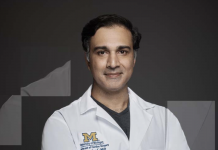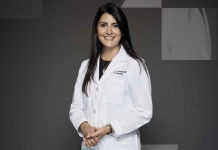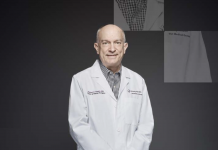
Dr. Lamont R. Jones has dared to disagree with his 99-year-old grandmother, Sarah Brown, only twice in his life: once when he tweaked her Thanksgiving recipes, and a second time, more recently, when she challenged the efficacy of the COVID-19 vaccines. “Grandma, I don’t normally go against what you say,” Jones, vice chair of otolaryngology at Henry Ford Hospital, told the family matriarch, who lives in Farmington Hills, “but I have to correct you on this one.”
Yet Brown’s skepticism is understandable. In her near-century as a Black woman in America, she has lived through several high-profile ethical atrocities perpetrated by medical researchers and practitioners against Black and brown populations. She was born just a couple of years after Henrietta Lacks, a Black woman whose cervical cancer cells were harvested without her consent for years of ongoing study. She was 10 at the start of the Tuskegee experiment, the notorious 40-year study in which 600 Black men were lied to and intentionally left with untreated syphilis.Ěý
And those are just the historical headlines. Racism in medicine is still alive and well today, Jones says, and racial injustices that surged to the fore in 2020 have reignited long-smoldering flames of doubt.
Doubts about the COVID-19 vaccines run rampant across the country, and nowhere are they more prevalent than in Black and brown communities, which have been hardest hit by the pandemic. This is a huge problem for everyone in metro Detroit, public health experts say, because immunizing primarily white people won’t achieve the herd immunity — which requires around 80 percent of the public to be vaccinated — necessary for the region to move on economically and socially from the pandemic.
In Michigan, Black people have suffered a 40 percent higher COVID-19 case rate than whites and are three times more likely to die from the disease. The data in Detroit are even more startling; Detroiters account for one-quarter of the state’s COVID-19 deaths while making up only 7 percent of the population, said Dr. Herbert C. Smitherman, vice dean of diversity and community affairs at the Wayne State University School of Medicine, during a February virtual information session to encourage vaccinations among communities of color. Instead of demonizing people of color for their skepticism and mistrust, he argues, it’s time to make the system more trustworthy.Ěý
Jones and other doctors of color are working to help earn trust through online town halls, outreach to church groups, and difficult talks with their own families and friends. “There’s no question this country’s health care system has a history of mistreating people of color in particular,” said Dr. Joneigh Khaldun, the state’s top public health official, at another virtual information session in late February aimed at encouraging communities of color to embrace the vaccine.
As of late February, 1.2 million Michigan residents had received at least one of two required doses of the available vaccines, according to data from the Michigan Department of Health and Human Services. Of the 56 percent of reported recipients of doses for which race information was reported, 3.7 percent were Black, 41.7 percent were white, and 53.2 percent were of unknown ethnicity or were listed as “other.” Those figures are particularly alarming given that Black people make up more than 14 percent of the state’s population, according to 2019 U.S. Census Bureau data.
Several factors explain the low vaccination rate, from an inability for many residents to take off from work to a lack of transportation, but it’s the skepticism about the medical profession that creates an additional barrier that must be busted, doctors say. Nearly half of white Michiganders say they are “very likely” to get the vaccine, while only 25 percent of Black respondents say the same, MDHHS research shows.
Religious leaders, perhaps the most trusted figures in communities of color, are taking the lead alongside medical personnel. “God’s not going to do for you what you can do for yourself,” Bishop Charles Ellis III of the Greater Grace Temple in Detroit said at a recent town hall. “The Lord sends us medical experts and doctors.” Fears of vaccine side effects — a common complaint — are overblown, he insisted, quipping that “anything that goes in your body has an effect. If I eat ribs at night, it might have an effect at 2 a.m.”
There are efforts afoot to help eliminate the practical barriers to getting vaccinated. In February, the state began holding vaccine clinics at churches and other community centers in low-income areas, and the City of Detroit is offering $2 bus fare for anyone trying to get to the TCF Center for a vaccination appointment.
Meanwhile, Ellis and Jones say they’re combatting those who disseminate misinformation to scare an already nervous population. One example is Tamika Morrow, a nurse practitioner in Bloomfield Hills who has posted videos and messages online discouraging vaccinations with baseless claims that people who get it are putting themselves in danger of autoimmune problems to prevent an ailment — COVID-19 — that, she says, “99 percent of people recover from.” That is simply wrong; Michigan has seen a 2.6 percent fatality rate for COVID-19, above the national rate of 1.8 percent. And that doesn’t begin to account for the millions who have recovered only to face ongoing health problems associated with the coronavirus, experts say.
In actuality, most people of color know COVID-19 is deadly and can be devastating because they’ve likely had friends or relatives who have suffered or died. Jones, for instance, says a great aunt and a cousin both have died from the disease. And Dr. Kellie McFarlin, a Henry Ford Hospital surgeon, lost a 5-year-old cousin who had spent two weeks on a ventilator. McFarlin went on to volunteer last year to be part of the vaccine trial for Moderna, the maker of one of the three FDA-approved vaccines now available. “I don’t recall anything feeling as helpless as I did then,” McFarlin says of her cousin’s death. “When opportunities come about to feel like you could do something more, you take them.”
McFarlin speaks virtually to church and community groups, as do many other physicians of color. Often the concerns of the Black and brown people who attend are not founded in the historic racism that has damaged trust but in more practical questions about side effects and efficacy, she says.
Slowly but surely, the pro-vaccination campaign is gaining ground: “Just watching the expressions of understanding and nodding and the hearing the thank yous, it seems to help,” McFarlin says. “I have had a couple of people say it’s made them really think about it and they’d schedule an appointment. To me, that’s a win.”Ěý
|
| Ěý |
|








